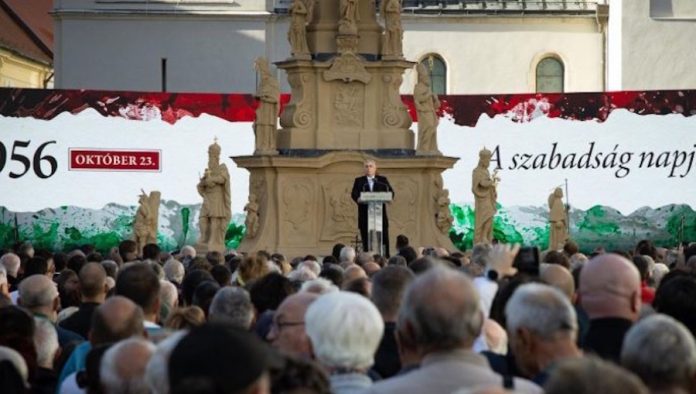Prime Minister Viktor Orbán spoke on the occasion of the anniversary of the 1956 Hungarian Revolution, criticising the European Union and comparing it to the Soviet Union.
Orbán also said that “Moscow was beyond repair, but Brussels and the European Union can be fixed”.
Hungarians commemorated the October 23, 1956, uprising against the Soviets that killed 2,500-3,000 Hungarians in a fortnight of fierce fighting, followed by the execution of 400 people. After the uprising was crushed, more than 200,000 people left the country in the following months, choosing mainly the United States.
The 1956 revolution is deeply rooted in the memory of Hungarians as a struggle for freedom against the Soviet Union. As in the previous speech, the politician carefully avoided comparing the war between Ukraine and Russia with the events of 1956.
Orbán spoke in Veszprem, which was the EU’s Capital of Culture in 2023, to a group of 1000-1500 invited guests. All media except state owned ones were excluded. He called the Hungarian people freedom fighters and characterised the Hungarian right-wing as the political heirs of the revolutionaries.
His speech marked the beginning of the 2024 European Parliament elections. He outlined a conservative programme during the speech. Some have noted that the Prime Minister does not want to risk counter protests during his speech and therefore favours small gatherings.
Considered Russian President Vladimir Putin’s only ally in the EU, he has actively opposed sanctions against Moscow, with Hungary the only country opposing arms supplies to Ukraine.
Brussels whistles, we dance as we like, and won’t if we don’t want to.
Orbán stated that dollars arriving from the West were being used to finance the opposition’s election campaign. He also claimed that cultural issues would be an important part of the elections, pointing out that Hungary’s sovereignty was threatened by external forces.
“Embrace the fact that you were born Hungarian, Christian, a woman or a man, that you are the child of your father and mother, the spouse of your husband or wife, the parent of your daughter or son; embrace that you are a friend and a son of your country and a patriot.”
The Prime Minister also noted that Hungary is not willing to give up its values in 1956, 1990 or 2023 for the sake of Moscow or Brussels.
Orbán regularly clashes with the EU on issues ranging from media independence and judiciary to migration and LGBT rights. However, the EU has launched a rule of law mechanism that has led to the suspension of transfers to Hungary.
While opposition parties remained inactive and refrained from holding anti-government rallies on the national day, civil society organisations as well as teacher and student movements took to the streets demanding freedom in education, higher salaries and the repeal of legislation changing the legal status of teachers.
Protesters gathered in Heroes’ Square and marched along the famous Andrassy Boulevard. The government had promised to raise salaries for teachers before the elections, but instead passed a decree that effectively made a strike impossible.
The solidarity movement grew stronger a year ago when six teachers were fired for participating in civil disobedience actions, but the protest weakened and failed to gain support from other social groups.
The entry into force of a new law on the teachers’ legal status has resulted in 1,500-2,000 teachers quitting, further exacerbating the labour shortage.
Gergely Karácsony, Budapest mayor, a member of the green-leftist Dialogue Party, stated that the spirit of the republic was present in the teachers’ and students’ movement, in trade unions, in civil rights movements, in local government and in the work of NGOs.
He ended his speech by promising to build a bridge between NGOs and political parties and to form an alliance of opposition parties in Budapest for next year’s local elections.
